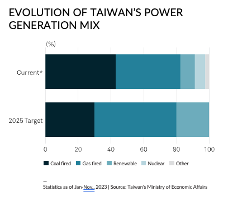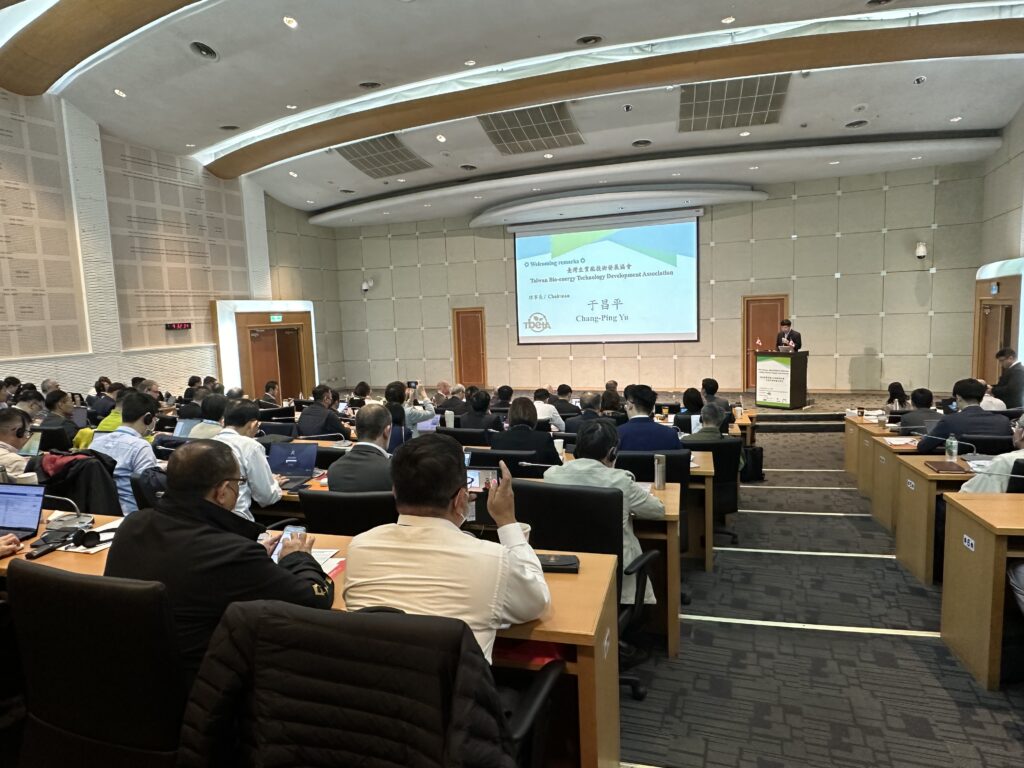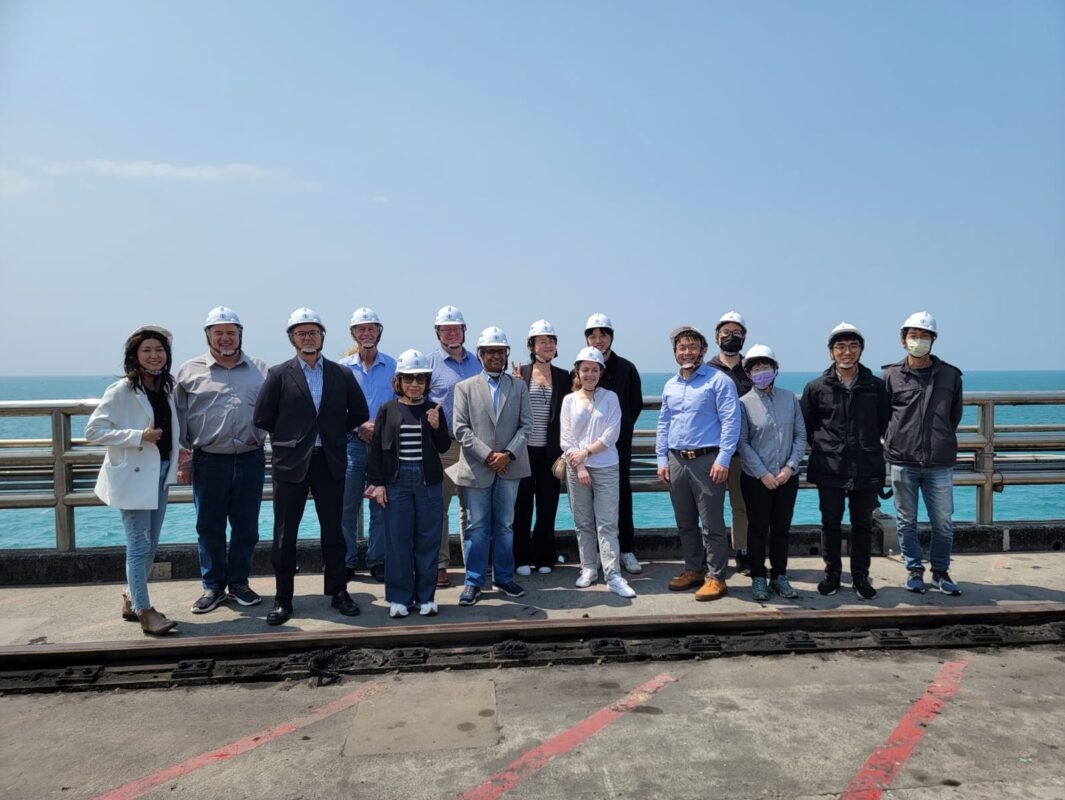In March 2024, the Wood Pellet Association of Canada (WPAC) and some of its members visited Taiwan on a trade mission, visiting prospective customers and their facilities and participating in a one-day conference on exploring the potential of the Taiwanese market. WPAC, the Canadian Trade Office in Taipei and the Taiwan Bio-energy Technology Development Association organized the mission.
After the trip, I can say for certain that Taiwan is emerging as a market of interest for Canadian wood pellet producers and has the potential to reach a similar scale to South Korea and Japan. Read the full report here.
Taiwan’s Growing Interest in Renewable Energy

The Taiwan Ministry of Economic Affairs (MOEA) has set a target of 20% renewable energy generation by 2025. Taiwan’s Greenhouse Gas Reduction and Management Act mandates a 20% reduction in annual carbon emissions by 2030 and a 50% reduction by 2050, based on 2005 levels. This translates to a reduction of 53 million tonnes of CO2 equivalent by 2030 and 133 million tonnes by 2050.
Currently, renewables account for less than 10% of Taiwan’s total energy output. The government aims to install 778 megawatts (MW) of biomass energy capacity by 2025, enabling the generation of 4.1 billion kilowatt hours (kWh).
Taiwan recently held a national election, resulting in a change in government. This has temporarily stalled progress on several previously announced bioenergy projects and how the government intends to support them. Nevertheless, mission participants observed that coal power station operators were enthusiastic about phasing out coal in favour of clean, low-carbon, renewable wood pellets. Taiwan has already done significant engineering studies on implementing the fuel change.
The Opportunity for Canadian Wood Pellet Producers
Taiwan is expected to import significant quantities of wood pellets to meet its green energy production goals. The Taiwan authorities’ commitment to generating sustainable bioenergy by using wood pellets could create a $450 million CDN wood pellet trade opportunity.
One of the projects of most immediate promise is with the state-owned Taiwan Power Company (Taipower), which is planning to convert 500-megawatt (MW) Number 1 coal-fired boiler in its Kaohsiung Hsinta Power Plant into a low-carbon biomass energy generation system specializing in burning wood pellets. Although with the recent change in government, the timing of this project is uncertain, when it does proceed, it will mark the first domestic case of transforming a decommissioned coal-fired unit into a biomass energy generation facility, serving as a technology demonstration for the transition of large-scale coal systems to clean energy in Taiwan. Taipower will seek to purchase 1.7 million tonnes of industrial-grade wood pellets annually for the updated facility.
There are also many independent power producers using coal boilers to produce electricity, especially for plastics, petroleum and paper manufacturing, who are interested in transitioning to renewable energy. The group visited some during the mission.

Ho-Ping Power Company is a coal-firing sub-critical pressure thermal plant with a gross generating capacity of 1,320MW (2x660MW). All of the electricity generated by the Ho-Ping Power Plant is sold to Taipower Company. This helps Taipower Company improve the power supply situation in the eastern region and slow down the 345kV ultra-high voltage north-south main line transmission in the western region, thereby improving the stability of Taiwan’s power supply system. Ho-Ping Power is looking at marine energy development, unit upgrading and a renewable plan that could include solar and a carbon reduction plan with wood-pellet co-firing and SRF gasification syngas co-firing.
Cheng Loong Corp., a paper and packaging company, has a biomass CFB boiler system at its Chupei Mill and will have one at its Houli Mill in 2026. The conversion at the Houli Mill is estimated to reduce GHG by 50k tCO2e/year. Cheng Loong Corp’s wood pellet demand is estimated at 54,000 – 56,000 tonnes in 2026.
While Formosa Petrochemical Corporation primarily refines crude oil, sells refined petroleum products and produces and sells olefins from its naphtha cracking operations, the company also provides electricity, steam, and other utility products generated from its co-generation power plants to plants in their area. Formosa’s Utility Department has four cogeneration plants with 16 boilers (11,580T/H) and 15 generators (2,750MW). To comply with ESG carbon reduction goals, Formosa will plan a small amount of wood pellet co-firing (5%) with three of its 600MW coal-firing boilers. At 5% wood pellets, it is estimated Formosa will need 560,000 tonnes of wood pellets per year.
Vietnam: Canada’s “Local” Competition
Vietnam surpassed Canada as the second-largest producer in the world in the past year. The country now accounts for 21% of global pellet supply compared to 12% for Canada. Given the country’s proximity to Taiwan, Vietnam is well-positioned to be a leading wood pellet supplier. Vietnam has low labour costs, paying salaries of just $400 to $500 USD per month, and has abundant raw material from domestic forest plantations. On the other hand, Canadian pellet producers are known for their high product quality and strong sustainability credentials. Nevertheless, the potential market should be large enough for Vietnam, Canada, and many other countries to supply Taiwan.
The Future of Energy: Solid Biofuels
Over 170 people from Southeast Asia, North America, and Europe attended the 2024 Taiwan Solid Biofuels Conference, hosted by Taiwan’s Bio-energy Technology Development Association and co-organized with Canada’s Trade Office in Taipei. The conference focused on helping industries and government agencies understand international solid biofuel development and market trends and plan for a low-carbon transformation.

Ed Jager, Senior Trade Commissioner / Director of Trade and Investment with Canada’s Trade Office in Taipei, opened the session. He stated, “The benefits of wood pellets and solid biofuel as a replacement for coal and other fossil fuels are clear. By embracing these sustainable energy sources, we not only safeguard our planet for future generations but also pave the way for a more prosperous and resilient society.”
By 2150, fossil fuels will no longer be a primary source of energy and heat. Much of this change will be driven by the increasing impacts of global warming and human-driven solutions to combat climate change. Keynote speaker Dr. William Strauss, President of FutureMetrics, explained that the consequences of climate change are not only environmental and ecological but also economic.
“The increasing frequency and severity of the consequences of climate change will accelerate decarbonization policies in most nations,” Dr. Strauss stated. “Sustainably sourced biomass is the foundation for several decarbonization pathways. The market for industrial pellet fuel could reach 55 million tonnes by 2030.”
Fiona Matthews, Director of Hawkins Wright, provided an outlook for global solid biofuel markets in 2025 and beyond. Pellets are the largest type of traded biomass at more than 27 million tonnes/year. There has been significant growth in pellet demand from Japan, mainly from new builds. She believes that there will be a wider uptake of co-firing in the future.
Tony McRae, Director of Sales with Drax, provided an overview of the wood pellet supply chain and quality considerations. He explained that supporting global customers requires world-class logistics; with transportation costs making up 70-80% of the delivered price. “Canada has a highly sophisticated supply and logistics chain from the transportation from Western Canadian pellet plants via train to two ports on the west coast and onto vessels to Asia; the majority of these vessels are charter vessels providing increased flexibility and service from Drax,” said Mr. McRae.
Canada’s Advantage
Canada is well-positioned to become a reliable supplier of high-quality, sustainably-produced, climate-friendly wood pellets to Taiwan. We can offer Taiwan advice on several fronts, including safe transportation and storage of pellets, logistics solutions, and policies supporting further uptake of wood pellets.
Based on the group’s conversations during the mission, the government and private sector in Taiwan are interested in working with Canadian producers. WPAC and its members are looking forward to continued outreach and education with Taiwanese audiences.
Gordon Murray is the Executive Director of the Wood Pellet Association of Canada

